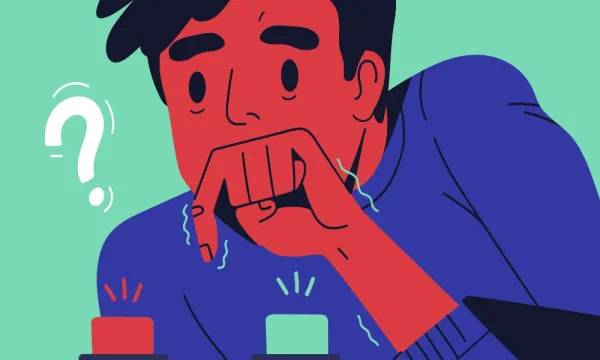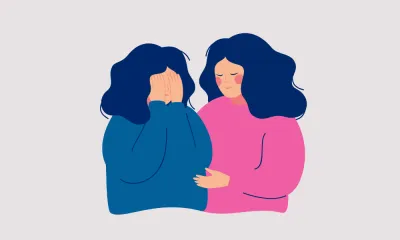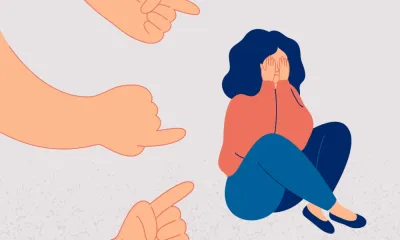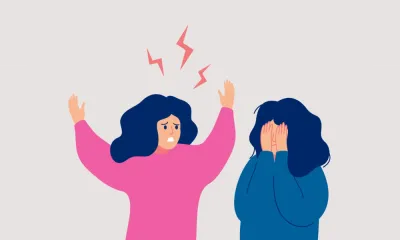We’ve all met our fair share of difficult people. Interacting with them can leave us hurt and drained, so we tend to avoid them like the plague. What if you’re the difficult person in the equation? Well, among other things, your social calendar might look a little empty.
Do you pass the difficult person test?
Things to know
- Difficult people score low in Agreeableness and Openness and high in Neuroticism, among other things.
- Behaviors such as manipulation, domination, and aggressiveness are often found in difficult people, and this typically stems from a desire for power or control.
- Even difficult people can change. Extreme objectivity and therapy can help difficult characters to see the truth and new ways of being.
To help you figure this out further, here’s what we’ll be looking at:
- The "Big Five" Indicators
- Characteristics Of A Difficult Person
- The Difficult Person Test
- What To Do If You're A Difficult Person
The "Big Five" Indicators
In 2021, Dr Chelsea Sleep and her colleagues at the University of Georgia looked into the key factors that define difficult people. According to their research, the quality most associated with difficult people is antagonism.
Using scientific methods, they determined that antagonism could be broken down into seven factors. They also found that antagonism was linked to agreeableness, one of five personality traits explored in the Five-Factor Model of Personality.
The Five-Factor Model is the most commonly used model by personality researchers. Developed after generations of research, it has conceptual and empirical strengths that other models lack.
The model attempts to explain how we think, feel and behave. It breaks our personalities into five major traits commonly referred to as the ‘Big Five.’ These are:
Agreeableness
Agreeableness includes qualities such as kindness, affection, altruism, and trust. If you're an agreeable person, you work well with others your levels of empathy are high. You tend to be mindful of how you treat people and what you say to them.

If you're disagreeable, you have no qualms about using people to get what you want. You don't care about how other people feel, and your levels of empathy are low. Additionally, putting others down is something you do quite often.
Neuroticism
Neuroticism is associated with sadness, moodiness, and emotional instability. If you're neurotic, you tend to experience anxiety, mood swings, and irritability. You tend to stress and worry about things.
If you're low in neuroticism, your mood tends to be more stable. You’re more relaxed, and you’re able to cope with stress better.
Extraversion
If your extraversion score is high, you're excitable, sociable, talkative, and assertive. Being around people makes you feel energized, so you're outgoing and emotionally expressive.
If you're introverted, you’re reserved, and social settings are draining. It's only in solitude that you're able to recharge. You're careful about the things you say, and you don't like being the center of attention.
Openness
Openness is associated with traits such as imagination and insight. You're creative, adventurous, and open to new experiences. You're curious and eager to discover new things about the world and the people around you.

Lower openness means you're more traditional in your approach to things. You prefer stability, and you're opposed to change.
Conscientiousness
If you're conscientious, you're thoughtful, disciplined, and goal-oriented. Organization and attention to detail are your strong suits. You plan ahead and stick to deadlines.
If you score lower, you dislike structure or schedules. You’re also more prone to procrastination.
The verdict
So, what is a difficult person? If you answered that it’s someone who’s antagonistic or low in agreeableness, that's the correct answer. However, there are a few more things we’ve got to explore to help you figure out if you’re a difficult person.
Characteristics Of A Difficult Person
Research has identified seven characteristics of a difficult person. Let's take a look at each of these qualities:
Callousness
Callousness is a lack of emotion. It's characterized by a lack of empathy or concern or a cruel disregard for others. Callous people tend to lack basic qualities like empathy, kindness, and self-awareness. As a result, they struggle to maintain successful personal relationships.
What it looks like: You’re insensitive towards others. You do and say things with little thought, and you may make those around you feel defensive or unsafe.
Think about the quality of the relationships in your life:
- Do you find it hard to make and sustain emotional connections?
- Do you make jokes at other people’s expense?
- Are you often annoyed and frustrated with your loved ones?
Grandiosity

Grandiosity is an unrealistic sense of superiority. It’s linked to narcissism and usually points to low self-esteem and overcompensation.
Over time, this toxic trait can affect personal relationships and negatively impact a person’s well-being.
What it looks like: You believe you’re better than others and that you deserve special treatment. You're prone to bragging and being dismissive of others. You may even believe you're above certain rules.
Consider how you view yourself and your achievements.
- Do you feel the need to constantly describe your talents, abilities, and accomplishments in great detail?
- Do you lash out when your skills and knowledge are questioned?
Aggression
Aggression is associated with hostility, rudeness, and forceful or violent behavior. Aggression is destructive and leads to strained personal and professional relationships. It may even have legal consequences.
What it looks like: You tend to use shouting and harsh language to get your point across. You might even resort to more passive forms of aggression, like the silent treatment. When things don't go your way, you tend to resort to coercion. You find it hard to resist the impulse to harm people or destroy their belongings.
Reflect on your typical response to frustration or disappointment.
- Do you lash out physically or verbally?
- Do you experience uncontrollable emotions when you feel you’ve been wronged?
- Do you feel the need to get even?
Suspiciousness

Suspiciousness refers to a strong or unreasonable distrust of others. It can also manifest as extreme skepticism or a tendency towards conspiracy theories and pseudoscience.
Being overly suspicious can negatively impact a person’s well-being and interpersonal relationships.
What it looks like: You often believe that others are trying to harm or exploit you. You’re reluctant to confide in people as you feel they might judge you or use it against you. You question the loyalty of your friends or romantic partners and try to control them.
Think about how you treat the people in your life:
- How do you perceive people you meet for the first time?
- Do you make your loved ones check in with you constantly?
- Does the thought of betrayal make you hostile?
- Do you tend to avoid getting to know people?

Manipulation
Manipulation refers to the tactics that a person uses to exploit or gain power over others. These tactics usually include the abuse of people's mental and emotional well-being. The impact can be brutal, leaving victims feeling confused, isolated, or even depressed.
What it looks like: You’re willing to resort to coercion and deception to get what you want. You like to know people’s weaknesses and strengths so you can take advantage of them.
Reflect on what you tend to do to get what you want or need:
- Do you tend to lie or conceal your true intentions?
- Do you find ways to shift the blame when people call you out on your actions?
Dominance
Being domineering is a desire to exercise power and influence over others. When combined with emotional intelligence and altruism, this trait can be used for the greater good.
However, when dominance is used as a way to punish or control, the effects on one’s personal and professional life can be dire.
What it looks like: You feel like you must be in control of everyone and every situation.
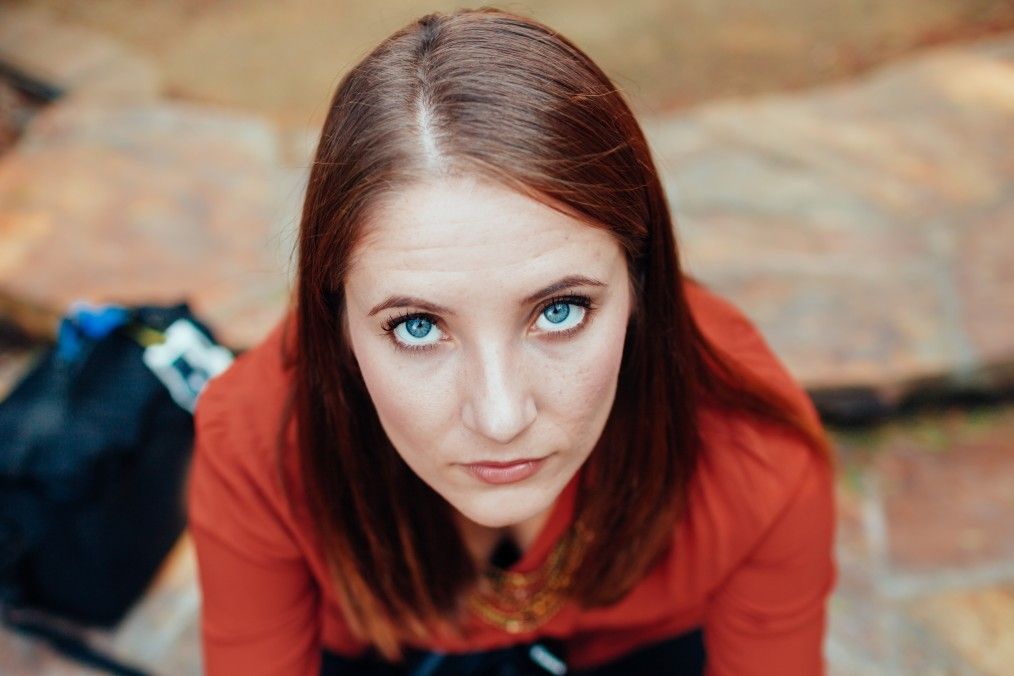
Reflect on how your efforts tend to be received:
- Have you been called bossy or overbearing?
- Do you tend to butt heads with colleagues, friends, and family members?
- When things aren’t entirely in your control, do you respond with aggression?
Risk-taking
Risk takers tend to seek thrills and engage in risky behavior. This can include abusing alcohol, taking illicit substances, shoplifting, driving under the influence, gambling, or engaging in unprotected sex.
While risk-taking certainly has its positives, it can lead to impulsive or destructive actions when taken to extremes. Risk-takers might suffer unintentional injuries, and their actions might cause harm to the people around them.
What it looks like: You tend to do things purely for the adrenaline rush. You seek thrills and engage in dangerous behaviors for the fun of it. You never consider the consequences of your actions. Plus, your loved ones have expressed concern over your lifestyle choices.
It’s time to reflect.
- Have you suffered significant injuries or incurred financial loss because of your choices?
- Have you caused your loved ones serious harm?
- Have the people in your life cut you off or labeled you toxic?
The Difficult Person Test

The difficult person test measures the seven characteristics associated with difficult people.
While Dr. Sleep and her colleagues are in no way associated with the famous test, its creators (IDRlabs) state that it is based on their research. Thanks to social media, the test has gained popularity. If you’re having flashbacks of college or high school exams, don’t worry, they aren’t essay-type or multiple-choice questions.
The free test actually consists of 35 statements, not test questions. You just have to agree or disagree with the statements. It's a stress-free test-taker experience. Plus, your test results are generated instantly without the need to sign up or provide your email address.
Just don’t expect detailed information on specific questions, a score report, or any kind of guide on what the passing score or pass rate is. You won't have access to your raw scores for each factor, just an overall percentage.
Don't get too attached to the results from your first attempt. If you took the test after a long day at work, next time, try taking it in the morning and see how that affects your results.
Remember, a proper personality evaluation or mental health assessment can only be done by a qualified mental health professional. As with all personality tests, consider it a tool to point out areas you might want to work on or develop. If you’d like to take the test, you can do so here.
What To Do If You're A Difficult Person
So, do you pass the difficult person test?

We all have difficult traits. Even the most agreeable people tend to behave in disagreeable ways. With self-awareness, the right help, and conscious effort, you can become a more agreeable person.
A better understanding of your difficult traits will allow you to take an objective look at your actions and see how they affect others. You’ll also be able to get the right help.
Consider getting a personality evaluation or mental health assessment done by a qualified mental health professional. You'll be able to get to the root of your difficult traits and how best to manage them.

